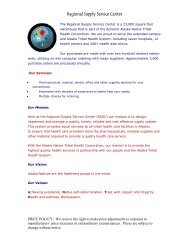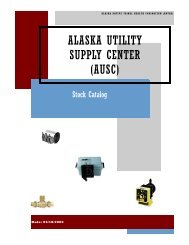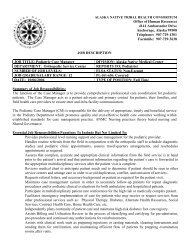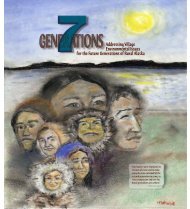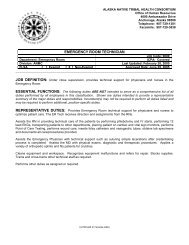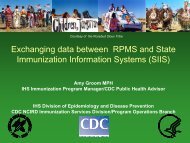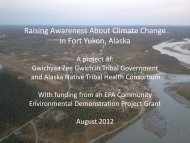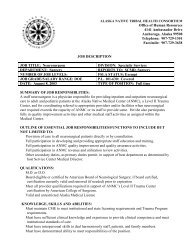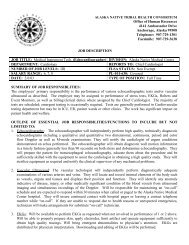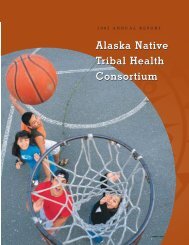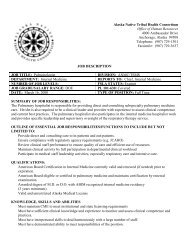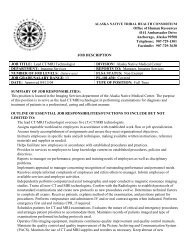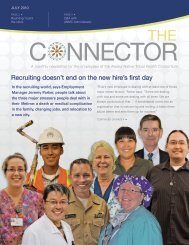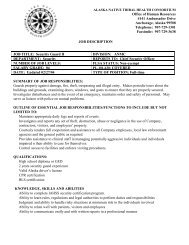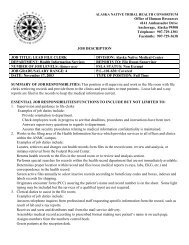Draft Final Climate Change and Health Impacts Point ... - ANTHC
Draft Final Climate Change and Health Impacts Point ... - ANTHC
Draft Final Climate Change and Health Impacts Point ... - ANTHC
Create successful ePaper yourself
Turn your PDF publications into a flip-book with our unique Google optimized e-Paper software.
PREFACE<br />
In May 2006, the Center for Research on Environmental Decisions at Columbia University hosted a<br />
workshop in Kotzebue with the purpose of identifying climate change impacts, key vulnerabilities, <strong>and</strong><br />
adaptation options (Gregory et al., 2006). In November 2007, a second workshop, hosted by the Alaska<br />
Center for <strong>Climate</strong> Assessment <strong>and</strong> Policy was held in Kotzebue to report on climate research activities<br />
<strong>and</strong> explore further research needs <strong>and</strong> opportunities (Trainor, 2007). In both meetings, concerns were<br />
raised about the safety <strong>and</strong> security of food <strong>and</strong> water resources, community vulnerability to changes<br />
occurring on the l<strong>and</strong> <strong>and</strong> sea, <strong>and</strong> the affects of climate change on public health.<br />
Participants called for more community‐based research <strong>and</strong> development of processes to assess local<br />
climate impacts. This paper reports on the findings from one community <strong>and</strong> demonstrates a process for<br />
evaluating local climate impacts on health. What occurred in the past is reported based on the record,<br />
<strong>and</strong> the recollection of <strong>Point</strong> Hope residents. What will happen in the future is unknown, <strong>and</strong> the reader<br />
is reminded that all predictions included in this report are subject to inherent uncertainty, <strong>and</strong> limited by<br />
the quality of data <strong>and</strong> the state of the science in this developing field of health impact assessment.<br />
INTRODUCTION<br />
<strong>Climate</strong> change refers to any change in climate over time, whether due to natural variability or as a<br />
result of human activity (IPCC, 2008). <strong>Climate</strong> is changing rapidly in the Northwest Arctic <strong>and</strong> leadership<br />
organizations seek better information about impacts <strong>and</strong> vulnerabilities, so that adaptive measures can<br />
be developed. This includes new approaches for developing health infrastructure <strong>and</strong> providing health<br />
services <strong>and</strong> health care. The twelve Northwest Arctic communities receive health services from<br />
Maniilaq Association, the regional tribal health consortium for the Northwest Arctic (Figure 1).<br />
The community of <strong>Point</strong> Hope is located at the western most point on the northwest Alaska coast<br />
(Figure 2). Life in <strong>Point</strong> Hope revolves around the harvest of sea mammals: walrus, seal, <strong>and</strong>, most<br />
importantly, whale. In 2009, many things are the same as they have been for thous<strong>and</strong>s of years;<br />
whaling crews <strong>and</strong> their families spend months preparing for the spring hunt, repairing skin boats <strong>and</strong><br />
wooden sleds, mending clothing <strong>and</strong> tents, sharpening harpoons, <strong>and</strong> preparing underground food<br />
cellars for storage of meat <strong>and</strong> blubber. But whaling, like other aspects of life in <strong>Point</strong> Hope, is changing.<br />
In almost every month the air temperature is warmer. Sea ice is diminishing, making travel <strong>and</strong> hunting<br />
more difficult <strong>and</strong> dangerous. New species of plants, fish, birds, <strong>and</strong> other wildlife are becoming<br />
increasingly common, while endemic species such as walrus are becoming increasingly rare. L<strong>and</strong> is<br />
thawing, washing away into the rivers or disappearing in great chunks into the Chukchi Sea. Warming<br />
water is causing blooms of algae in tundra ponds, changing the ecology <strong>and</strong> diminishing drinking water<br />
quality.<br />
These changes are influencing food <strong>and</strong> water security <strong>and</strong> the potential for disease <strong>and</strong> injury. They are<br />
also raising new concerns about the effects of life‐altering change on the mental health of Arctic people.<br />
Many effects are negative, but some can be positive: new food resources, a shorter flu season,<br />
economic opportunity, <strong>and</strong> a lengthened season for making potable water. This project has recorded<br />
local observations, described climate relationships (where possible), <strong>and</strong> explored potential community<br />
health implications. It is hoped that this work will help facilitate informed decision‐making, <strong>and</strong> the<br />
development of adaptive measures that will encourage a safe, healthy, <strong>and</strong> sustainable future for the<br />
people of <strong>Point</strong> Hope.<br />
3



